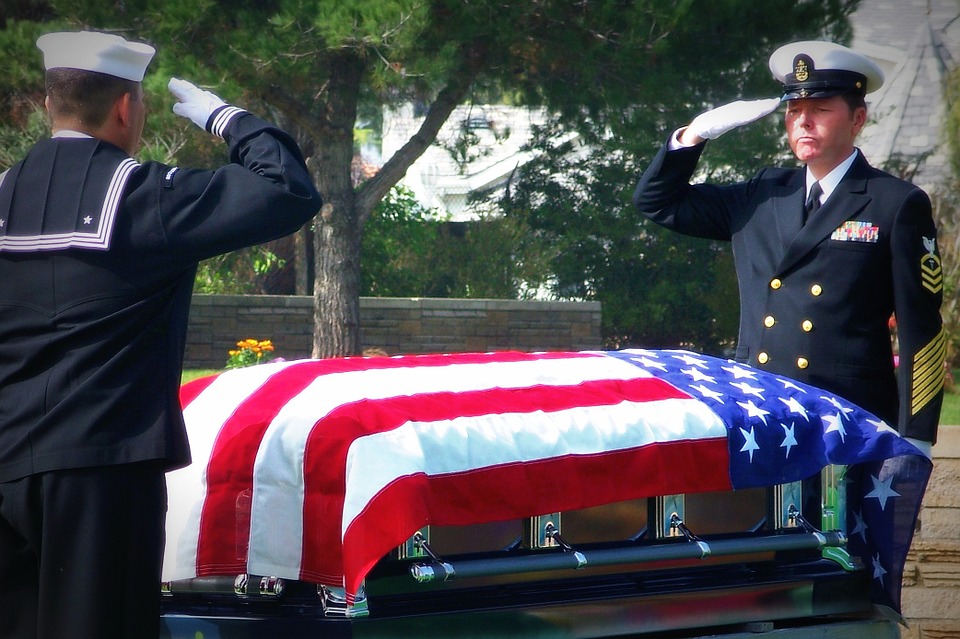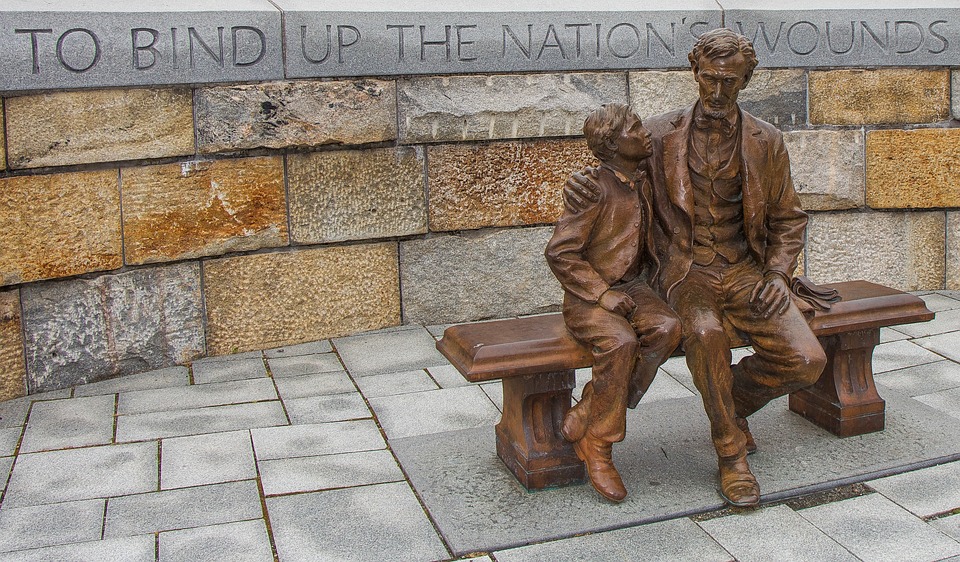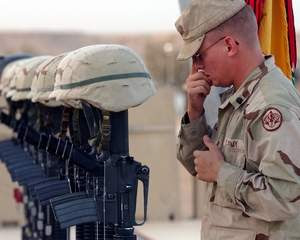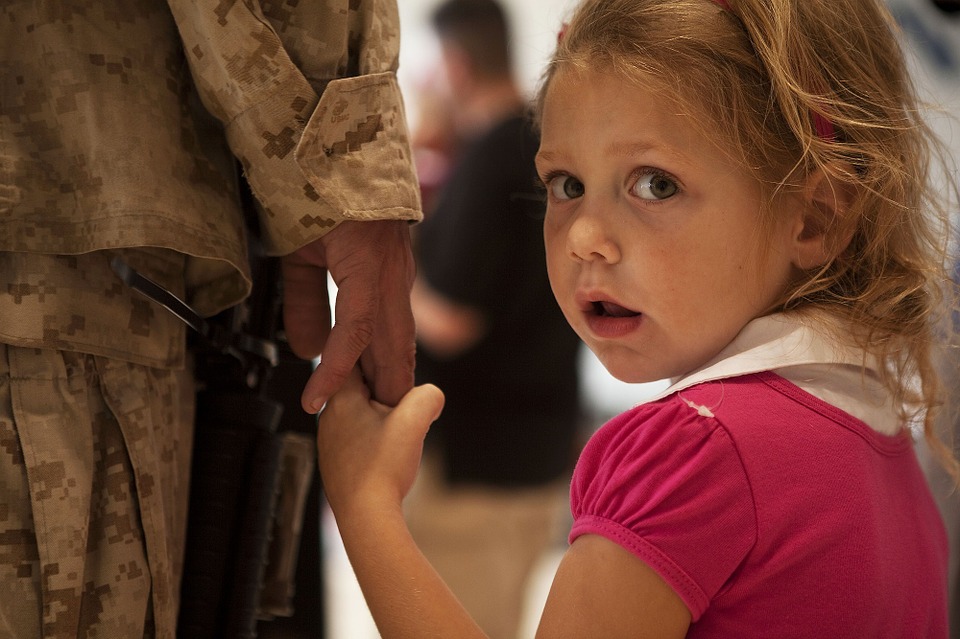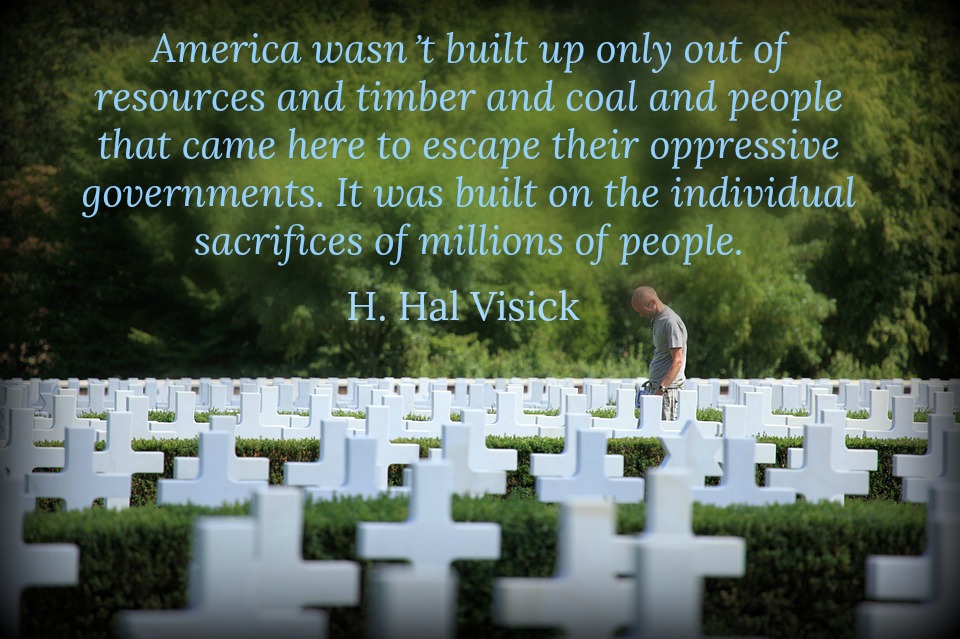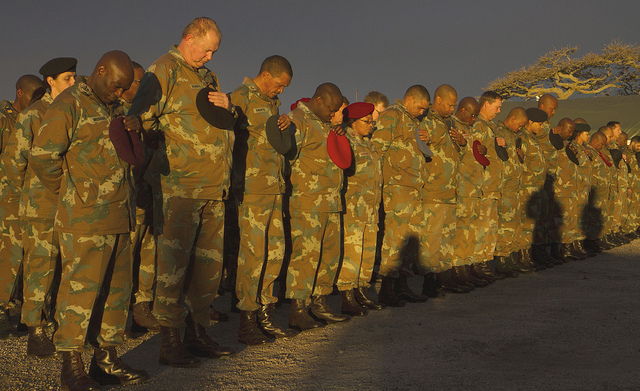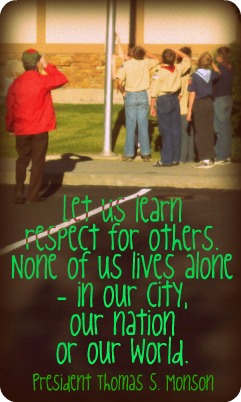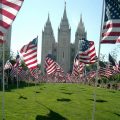Memorial Day is becoming one of those holidays that we look forward to because we get an extra day off of school and work— and it’s a sign that summer is almost here. But as a nation, we can’t afford to lose sight of the true reason that this day was set aside— to honor our American soldiers who made the ultimate sacrifice in the service of our country. John S. Tanner, at the time an associate professor of English at Brigham Young University, explained,
… We live in a world in which a sense of the sacred has been severely eroded. Former ages were powerfully imbued with a sense of sacred time and space. Today, by contrast, what once were “holy days,” like Easter and Sunday, are now “holidays.” What originally were designed as celebrations of foundational events and values for the community (Memorial Day, Presidents’ Day) are now little more than excuses for three-day weekends. Similarly, there is a modern tendency to reduce flags to mere decorative cloth, cemeteries to parks, churches and national monuments to brick and marble. In a world where little is sacred, it is hard to remember, much less to respect, the vital difference between the sacred and the profane.
Memorial Day is set aside as a show of gratitude, a day of remembrance and a time to pray for peace. It’s easy to forget the true meaning and history of this day, but it’s time to remember its significance.
The History of Memorial Day
The practice of honoring our dead— and our deceased war heroes— can be traced back to ancient civilizations. But our modern commemoration has its roots in the years following the American Civil War. There is no consensus on where the initial Memorial Day celebrations began, but the first officially declared day was in 1868. According to the U.S. Department of Veterans Affairs,
Local springtime tributes to the Civil War dead already had been held in various places. One of the first occurred in Columbus, Miss., April 25, 1866, when a group of women visited a cemetery to decorate the graves of Confederate soldiers who had fallen in battle at Shiloh. Nearby were the graves of Union soldiers, neglected because they were the enemy. Disturbed at the sight of the bare graves, the women placed some of their flowers on those graves, as well.
Today, cities in the North and the South claim to be the birthplace of Memorial Day in 1866.
After this bitter and bloody war that left so much devastation and so many casualties, Americans began coming together to honor those who had sacrificed so much for the causes in which they believed. Initially, Americans celebrated Decoration Day on May 30—possibly with the belief that flowers would be blooming all over the country by this time of the year— and only honored those who died in the Civil War. But through the years this has been expanded to include those who have died in all American wars. In 1971, Memorial Day was officially declared a federal holiday and placed on the last Monday in May.
The Importance of Remembering
Memorial Day is a fitting name for this holiday. Merriam-Webster’s Dictionary defines memorial as:
Something that keeps remembrance alive;
b: Something (such as a speech or ceremony) that commemorates
For those who believe in God and in religion—such as members of The Church of Jesus Christ of Latter-day Saints— remembering is an important concept. Elder Dennis B. Neuenschwander taught,
Remembering important things is fundamental to both our temporal and spiritual well-being. Confusing what we should remember with what we can or ought to forget creates difficulties for us. Much trouble in life originates from forgetting what we should remember and remembering what we should forget. …
It seems to me that living the gospel has as much to do with remembering important things as it does with knowing them in the first place. The word remember and its derivatives appear hundreds of times in the scriptures—certainly a lot to remember! This repetitious scriptural reminder to remember takes on added significance when we understand that in Hebrew the word remember has a much broader meaning than does the English connotation of “keeping something in mind.” In the Hebrew context, “doing” is an essential part of the remembering process. Thus, “to remember” is “to do,” whereas “forgetting” is “failing to do.”
Remembering is more than passively keeping something in mind. It requires action on our part. Thus, Memorial Day is more than just remembering those who have given their lives in service of our country. It is actively honoring their sacrifice by doing our part to preserve the freedoms for which they fought.
Remembering Those Who Have Sacrificed
Ultimately, Memorial Day is a time to remember those who paid the ultimate sacrifice in the cause of freedom. But each fallen soldier had a family back home who mourned his or her loss. According to PBS.org,
Since the earliest ceremonies in small American towns following the Civil War, we have gathered on Memorial Day to honor and remember those who made the ultimate sacrifice in service to our nation. As in those early days of laying wreaths and placing flags, our national day of remembrance is often felt most deeply among the families and communities who have personally lost friends and loved ones.
This national holiday may also be the unofficial start of the summer season, but all Americans must take a moment to remember the sacrifice of our valiant military service members, first responders and their families. Memorial Day is a day of both celebration and grief, accounting for the honor of our heroes and reflecting on their tragic loss.
Civil War soldiers had been mustered from towns and villages across the land. Like today, the loss of each soldier was a profound tragedy for both family and community.
Today, we honor service members from all of America’s past wars. But there is immediacy in our sorrow; the wounds of war are new again. As we struggle for ways to heal, Abraham Lincoln’s message of almost 150 years ago can still inspire us.
This, then, is the mission of Memorial Day: to reach out in support of all the soldiers and their families who have sacrificed so much for us.
Don’t Forget the Families
During the Civil War, 620,000 American soldiers lost their lives. Those numbers have decreased in subsequent wars, but the impact on the families of the fallen soldiers is just as devastating. As PBS pointed out,
The number of battle deaths speak to the sacrifices our soldiers and their families have made.
H. Hal Visick, at the time the assistant to the president and general counsel for Brigham Young University, said,
President Lincoln was informed by the Secretary of War that a certain Mrs. Bixby had lost five sons in the Civil War. He was moved and troubled by this immense, enormous loss that had come into her life. …We have it as it was printed later:
I feel how weak and fruitless must be any words of mine which should attempt to beguile you from the grief of a loss so overwhelming. But I cannot refrain from tendering to you the consolation that may be found in the thanks of the Republic they died to save. I pray that our heavenly Father may assuage the anguish of your bereavement, and leave you only the cherished memory of the loved and lost, and the solemn pride that must be yours to have laid so costly a sacrifice upon the altar of freedom. [Carl Van Doren, editor,The Literary Works of Abraham Lincoln (New York: Press of the Readers Club, 1942), p. 272]
Sacrifice. . . .He could see what we ought to see when we look at America: That it wasn’t built up only out of resources and timber and coal and people that came here to escape their oppressive governments. It was built on the individual sacrifices of millions of people.
The Importance of Sacrifice
Sacrifice is giving up something that you want for something that is better. And it is an essential part of life in America. Visick said,
Sacrifice is … being somewhere you’re needed, where you’ve got to serve when you’d rather be elsewhere or do something else.
Parents love their children, but their love grows immeasurably as they sacrifice for the welfare of their children. Visick continued,
Of course, the child has to learn to love, too. And when he doesn’t pay the price, doesn’t serve, he doesn’t learn to love. It seems that when we make an investment in something, we value it, we care for it.
It is the same with our country. If we don’t pay the price, if we don’t sacrifice then we will not understand how to truly love the land in which we live. This is a problem today. We take so much for granted because we didn’t work for it—our forefathers did. Elder Vaughn J. Featherstone taught,
I think it is time we should all awaken. Our concern isn’t about the flames of freedom which burn so brightly in our generation; the concern is that in the upcoming generation the fire has never been kindled. Our youth have never known anything but criticism of the United States of America. We need some faithful, free-loving patriots who will issue forth a clear, loud trumpet call. Remember Paul’s counsel: “For if the trumpet give an uncertain sound, who shall prepare … to the battle?” (1 Corinthians 14:8.) Freedom ought to ring in the heart of every Latter-day Saint regardless of his country.
It’s time for the us to step forward and take responsibility for our own freedoms— not only the ones we have but also the ones we are passing down.
Remembering Goodness
Memorial Day is also a time to reflect on just how blessed we are to be in America. Too many Americans now are looking to Europe as the example of what we should be, but we aren’t Europe. We are the United States of America. We need to look around and see the things that make our nation great and hold onto them. And we need to look back at our history for the same reason. President Ezra Taft Benson said,
It has been well said that “our greatest national problem is erosion. Not erosion of the soil, but erosion of the national morality.”
The United States of America has been great because it has been free. It has been free because it has trusted in God and was founded upon the principles of freedom set forth in the word of God. This nation has a spiritual foundation. To me, this land has a prophetic history.
Alexis de Tocqueville, a famous French historian who studied America in the 1830s, wrote,
I sought for the greatness and genius of America in her commodious harbors and her ample rivers, and it was not there; in her fertile fields and boundless prairies, and it was not there…. Not until I went to the churches of America and heard her pulpits aflame with righteousness did I understand the secret of her genius and power. America is great because she is good, and if America ever ceases to be good, America will cease to be great (Prophets, Principles and National Survival, compiled by Jerreld L. Newquist [Salt Lake City, Publishers Press, 1964], p. 60).
America’s greatness is found in her citizens’ ability to choose righteously because it’s the right thing to do. When we lose our sense of morality, we lose a sense of ourselves.
Remembering Gratitude
We’re all human, and part of human nature is looking around at what other people have and forgetting what we have. But Memorial Day is a reminder that we have many reasons to be grateful. President Thomas S. Monson taught,
Like the leprosy of yesteryear are the plagues of today. They linger; they debilitate; they destroy. They are to be found everywhere. Their pervasiveness knows no boundaries. We know them as selfishness, greed, indulgence, cruelty, and crime, to identify but a few. Surfeited with their poison, we tend to criticize, to complain, to blame, and, slowly but surely, to abandon the positives and adopt the negatives of life. …
This is a wonderful time to be living here on earth. Our opportunities are limitless. While there are some things wrong in the world today, there are many things right, such as teachers who teach, ministers who minister, marriages that make it, parents who sacrifice, and friends who help.
We can lift ourselves, and others as well, when we refuse to remain in the realm of negative thought and cultivate within our hearts an attitude of gratitude. If ingratitude be numbered among the serious sins, then gratitude takes its place among the noblest of virtues.
Expressing our gratitude is one way that we show our appreciation on Memorial Day. We show our gratitude by decorating graves as well as by honoring those who have or still are serving in the military. But we can expand our show of gratitude to include others who put their lives on the line in service to the public—such as police officers, EMTs and firemen.
My brother is in the military and has traveled in many countries throughout the world. I asked him once what makes America great, and his answer really surprised me. He said, “When you call 9-1-1, someone comes to help you. If someone is breaking into your house, you can call and get help. In some parts of the world, if you have an emergency there is no one to call for help.” It’s a sobering reminder of just how lucky we are to have people who sacrifice so much for the good of our communities.
Remembering to Pray for Peace
Unrest and discord are nothing new for Americans. When people are free to think, believe and act for themselves, there will be conflict. There is also much unrest and upheaval in the world. But we can take time this Memorial Day to remember to pray for peace. As President Donald J. Trump wrote,
Memorial Day is our Nation’s solemn reminder that freedom is never free. It is a moment of collective reflection on the noble sacrifices of those who gave the last measure of devotion in service of our ideals and in the defense of our Nation. On this ceremonious day, we remember the fallen, we pray for a lasting peace among nations, and we honor these guardians of our inalienable rights. …
On Memorial Day we honor the final resting places of the more than one million men and women who sacrificed their lives for our Nation, by decorating their graves with the stars and stripes, as generations have done since 1868. We also proudly fly America’s beautiful flag at our homes, businesses, and in our community parades to honor their memory. In doing so, we pledge our Nation’s allegiance to the great cause of freedom for which they fought and ultimately died.

